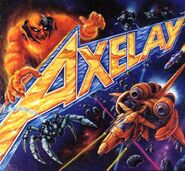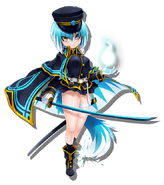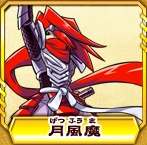Since the first game in 1987, there have been several cameos and references to GetsuFumaDen in other games and publications over the years. Additionally, there exist a few references to other works within the GetsuFumaDen games themselves.
Video games[]
Genpei Tōma Den[]
- Genpei Tōma Den (源平討魔伝), released in English as The Genji and the Heike Clans in Namco Museum Vol. 4, is a 1986 arcade game from Namco that served as the primary inspiration for GetsuFumaDen.
- It features three primary modes of play (side-scrolling platformer levels, top-down maze-like levels, and side-scrolling action levels with more advanced combat and no platforming which house the game's bosses), a format that GetsuFumaDen copied, swapping out the blown-up side-scrolling action levels for the 3D dungeon mazes.
- Genpei Tōma Den also opens with an old woman relating the story to the player, explaining that historical samurai Taira no Kagekiyo is being revived to exact revenge for his clan after his death during the Genpei War. Kagekiyo is portrayed as a samurai in demon-faced armor with long red hair, has attacks that send out kanji at his enemies, and fights a variety of enemies based on Japanese folklore and mythology, similar to those that would later appear in GetsuFumaDen and Undying Moon.
- Kagekiyo must similarly collect three artifacts in order to create a powerful mystic sword capable of slaying his demonic foes, similar to Fuma's quest to retrieve his brothers' blades and combine them into one Hadou katana.
- Finally, Genpei Tōma Den uses torii to signify the end of a level, transporting Kagekiyo to the next area.
Castlevania series[]
- GetsuFumaDen features the enemy Shimon, a whip-wielding skeleton with a name similar to the protagonist of Castlevania, which had come out the year prior. The Castlevania series would go on to incorporate these enemies within its own series under a variety of names.
Castlevania: Harmony of Despair[]
- Castlevania: Harmony of Despair is a multiplayer Xbox Live Arcade and PlayStation 3 PlayStation Network game featuring characters, sprites and locations from several different Castlevania titles.
- The fifth and final downloadable pack for the game was titled The Legend of Fuma and contains levels, enemies, bosses, items and music directly from the 1987 Konami game GetsuFumaDen.
- Getsu Fuma, the main protagonist of GetsuFumaDen, is also available as a playable character on a separate DLC.
Konami Wai Wai World[]
- Konami Wai Wai World is a Konami mascot 2D platform game initially released for the Famicom game system in 1988. It contains characters and stages inspired by several other Konami games, including GetsuFumaDen.
Ganbare Goemon 2[]
Ganbare Goemon 2 is a Konami game for the Famicom game system released in 1989 that combines top-down action with the occasional 3D maze, similar to GetsuFumaDen, though lacking enemies, a format that actually first appeared in the first Ganbare Goemon title in 1986, predating GetsuFumaDen. In one section of the game, Goemon can purchase Famicom cartridges of various games from a shop that transform enemies in the area into characters from those games, including GetsuFumaDen, Konami Wai Wai World, and Antarctic Adventure.
Wai Wai World 2: SOS!! Parsley Castle[]
- Wai Wai World 2: SOS!! Parsley Castle is a Konami mascot 2D platform game released for the Famicom game system in 1991. It is a sequel to Konami Wai Wai World and again features various Konami stages and characters, including those from GetsuFumaDen.
Jikkyō Power Pro Wrestling '96: Max Voltage[]
- Jikkyō Power Pro Wrestling '96: Max Voltage is a 1996 pro wrestling video game developed by Diamond Head and published by Konami, released exclusively in Japan for the Super Famicom. The game features a number of wrestlers based on many Konami mascot characters, including "The Great Getsu Fūma".
Tokimeki Memorial 4[]
- A Getsu Fuma's armor appears as the bottom from the store for 150 Richs.
Otomedius Excellent[]
- Otomedius Excellent is an Xbox 360 horizontal scrolling shooter, part of the Otomedius series (which in turn is heavily inspired by the Gradius series) released in 2011. It features female characters representing different Konami franchises riding on vehicles or equipped with flying armor, Including Getsu Clan member Gesshi Hanafuuma as a playable character, and a revived Ryukotsuki as a boss, in a form based on her second phase from GetsuFumaDen.
Axelay[]
- Axelay is a shoot 'em up video game developed and published by Konami for the Super NES in 1992. Axelay is a sci-fi scrolling-shooter in the same vein as other Konami titles such as Life Force and Gradius. The game features both horizontal and vertically scrolling levels and allows the player to choose three different weapon-types, which increase in number as they progress through the game.
- In Otomedius Excellent, Gesshi Hanafuuma's spaceship is the Axelay Viper, which is inspired on the player's spaceship in Axelay (also from Konami).
Professional Baseball Spirits A[]
- This Konami-made mobile baseball title features cameos from many Konami characters in a support capacity, including Getsu Fuma.
Pixel Puzzle Collection[]
- A puzzle video game released by Konami Digital Entertainment for mobile devices on October 9, 2018. It features characters from several classic Konami franchises such as Castlevania, Gradius, Parodius, Bomberman, Milon's Secret Castle, and GetsuFumaDen, among many others.
Super Smash Bros. Ultimate[]
- The mix of "Go! Getsu Fuma" first used in Castlevania: Harmony of Despair is one of the music tracks accompanying Simon and Richter Belmont to the roster in Super Smash Bros. Ultimate for the Nintendo Switch.
Bombergirl[]
- A character Asagi possesses a blade called the Great Psychic Wave Sword (大念動波剣 Dainendōhaken), which noted to be a reference to the Hadou katana in concept art for her character, implying that it might be the very same sword that would later be wielded by Getsu Fuma in the future. In addition her skill, the Great Psychic Wave (大念動波 Dainendōha) is a technique that allows to create 3 spirit swords, a reference to the Hadou Katana's special three projectiles attack ability powered by the three blades in the original GetsuFumaDen.
- The character Chigusa also possesses a blade referencing the Hadou katana, the Evil Psychic Wave Sword (邪念動波剣 Janendōhaken), which she uses to curse enemies rather than attack them directly like her fellow officer Asagi.
- Bombergirl also features an arrangement of Go! Getsu Fuma as one of the crossover background music tracks that can play during matches.
Vampire Survivors: Legacy of the Moonspell[]
- The Legacy of the Moonspell expansion for indie game Vampire Survivors, itself heavily inspired by the Castlevania series, is in turn heavily inspired by GetsuFumaDen. The Moonspell clan of warriors and spellcasters has fallen, their mountain home overrun by yokai and oni, and the player must take control of the surviving members of the clan in order to reclaim the sacred ground.
- New characters include Miang Moonspell, Menya Moonspell, Syuuto Moonspell, and a few named Oni, each with different starting abilities and stat spreads, and were brought into the game alongside Mount Moonspell and a host of weapons and items inspired by GetsuFumaDen and Japanese folklore.
Rhythm games[]
pop'n music 18: Sengoku Retsuden[]
- pop'n music 18: Sengoku Retsuden is a 2010 music & rhythm video game by BEMANI and Konami and is the 18th main installment in the pop'n music series.
- The game features some remixes of music themes from GetsuFumaDen. Getsu Fuma, Ryukotsuki and other guest characters appear in animations to accompany these themes.
pop'n rhythmin[]
- Pop'n Rhythmin is a 2013 touch-screen "action game" of the pop'n music series. Unlike its arcade game counterpart, pop'n rhythmin consists of "Pop-kuns" scattering around the screen of your tablet or smartphone which must be tapped to play a sound.
- pop'n rhythmin features a mix of the main GetsuFumaDen theme as one of its tracks.
jubeat plus[]
- jubeat plus is the second mobile installment in the jubeat series which entails tapping on various grid squares on your touch screen that light up in various patterns in time to the music being played. The game contains a medley of the original GetsuFumaDen songs, titled 月風魔伝 メドレー.
SOUND VOLTEX BOOTH[]
- SOUND VOLTEX BOOTH, an arcade rhythm game from Konami's BEMANI division, features a remix of 龍骨鬼戦 (大ボス敵BGM), one of the background tracks from GetsuFumaDen, by yuukiss, titled 「月風魔伝」龍骨鬼戦 yks Remix.
BeatStream Anime Tribe[]
- The second and final release in the BeatStream series of arcade rhythm titles contains a mix of the original GetsuFumaDen theme.
Tokimeki Idol[]
- Tokimeki Idol is a Japanese smartphone mobile game by Konami. It is based off from Konami's video game series named Tokimeki Memorial. The game is about 15 idols, while you (the player), plays as their Producer, and help them achieve their goal of reaching the big stage.
- Tokimeki Idol features a remixing the main theme of GetsuFumaDen along with a costume inspired by the traditional Getsu Clan demon-faced armor.
Card games[]
Yu-Gi-Oh![]
- Many Konami franchises and characters have been represented with cards within the Yu-Gi-Oh! series of card and video games, including Getsu Fuma and Ryukotsuki, called "Ryu Kokki" in English due to a translation error.
- Additionally, Ryu Kokki serves as one of the Limited Duel opponents in Yu-Gi-Oh! Ultimate Masters: World Championship Tournament 2006, challenging the player to defeat her using no monsters that are not Zombie-Type.
- The Ryu Kokki card also shows up in the 33rd episode of the Yu-Gi-Oh! GX anime, though Ryu Kokki herself is not summoned.
Monster Retsuden ORECA BATTLE[]
- Monster Retsuden ORECA BATTLE is a Japanese trading card arcade game developed and published by Konami.
- One of the playable hero characters in this game is Getsu Fuma.
Manga[]
Famicom Ryu[]
- Famicom Ryu is a Japanese manga by Ryuichi Hoshino, serialized in Comic BomBom and published by Tentomushi Comics from February 18, 1986 to November 11, 1987, and later released in five tankōbon volumes.
- GetsuFumaDen features prominently in issue #5.
Famicom Wolf[]
- Famicom Wolf is a manga published by Tokuma Shoten that ran from 1986 to 1987 and which first appeared in Naughty Comics.
- Volume 5 (1987), created by Tetsuji Kataoka, features a small cameo by Getsu Fuma and Ryukotsuki.
External links[]
- Getsu Fūma Den at the Crossover Wiki






































